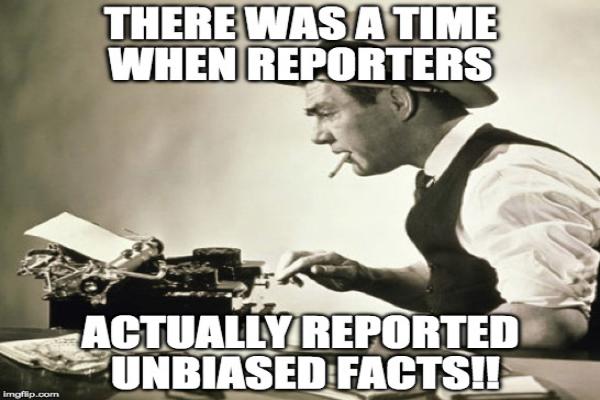On (unbiased?) Journalism in this digital age
Was there a time when reporters actually reported unbiased facts?

NAH. Hardly
</em></u>
Nah, probably not. Still, there is no doubt that journalism is more complicated than it has ever been. Here are few key factors, which is always useful to summarize, and a pointer to possible solutions.
First, too many sources
In the past, the “actual facts” were whatever newspapers and TV said. But that was only possible because there were much less sources, all of them professional.
Today, the Internet allows us to see what everybody else actually thinks. This makes accepting what truth is much more complicated than it used to be, because “there are more moving parts than ever”. And when that happens, “we can’t even pretend most of us agree on the truth of most assertions any more”.
Need of virality kills reputation
Why are “mainstream media” powerless to stop fake news and keep trust of people? Because they “look silly”, since at least 2011, thanks to Facebook algorithms that mix past and present in one timeless cauldron:
“In 2011, as everyone piles in from the social network, following links friends have picked, the ‘most viewed’ lists are skewed towards the most shared: the crowd, effectively, becomes the news editor, no matter how out of date the stories are”.
Big Data can paint the wrong picture
Sometimes, journalism is made harder also by what has been called The Hidden Biases in Big Data. Not all big data, mind you. Only those consisting of, or coming from, social media activity. In that sphere, there are little or no “news” coming from particular communities, especially when there should be more. A good explanation of this issue, that too many journalists still fail to grasp, is here:
"[In 2012] Hurricane Sandy generated more than 20 million tweets in four days, but these data don’t represent the whole picture. The majority of those tweets came from Manhattan, which was not the location of the actual disaster, but only the place of a “privileged, urban experience” of that hurricane."
Crisis of LOCAL journalism helps bad local politicians
This specific problem is well explained here:
- thanks to social media and search engines “it’s easier than before for opposition researchers on all sides to dig up dirt” when it is convenient for them
- but that all too often happens too late, that is after someone is elected: “The decline in local journalism means that politicians in the early stages of their careers, when they’re running for school board or city council, are not getting anything like the sort of attention they would have gotten when there was a reporter whose full time job was to cover such institutions or such elections”
The good part…
As far as truth goes, the privilege of being trusted again as those who “define” it, surely requires “journalism to be more open”: “admitting mistakes and being open about the process of fact-checking or truth-telling - and the inherently complicated nature of it - could actually increase trust in the media, as opposed to decreasing it”.
The good part is that, eventually, the journalism pains of today may very well be bring it “probably closer to the real thing than what our traditional media gatekeepers [gave us] in the past”.
Maybe it is true, and good, that what is dying is only “that flavor of objective journalism that PURPORTS to record an unbiased account of world events.".
Who writes this, why, and how to help
I am Marco Fioretti, tech writer and aspiring polymath doing human-digital research and popularization.
I do it because YOUR civil rights and the quality of YOUR life depend every year more on how software is used AROUND you.
To this end, I have already shared more than a million words on this blog, without any paywall or user tracking, and am sharing the next million through a newsletter, also without any paywall.
The more direct support I get, the more I can continue to inform for free parents, teachers, decision makers, and everybody else who should know more stuff like this. You can support me with paid subscriptions to my newsletter, donations via PayPal (mfioretti@nexaima.net) or LiberaPay, or in any of the other ways listed here.THANKS for your support!